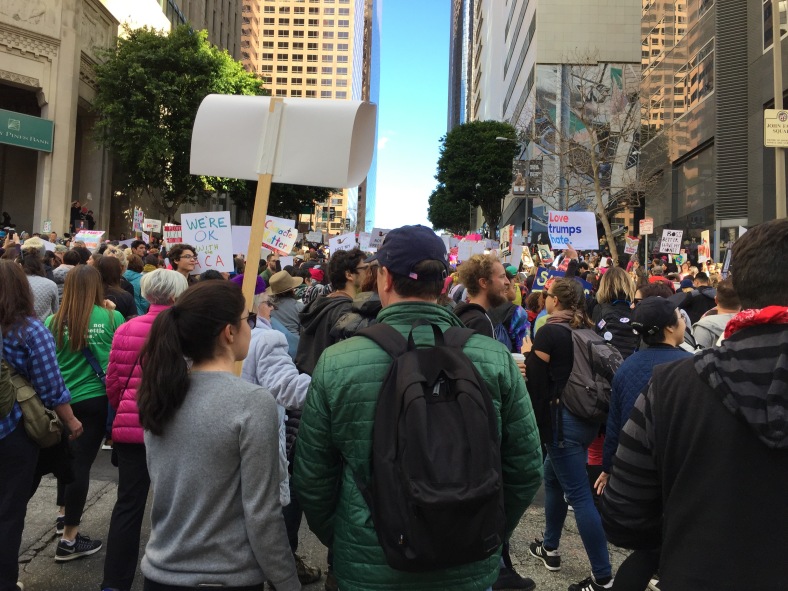The headline of the week@work did not originate in Washington D.C., but in Davos, Switzerland: ‘Davos Elite Fret About Inequality Over Vintage Wine and Canapés’. “…globalization has reduced the bargaining power of workers, and corporations have taken advantage of it.”
In other news – January is often a month of transition, not just in government, but across all fields. Articles this week@work explored the value of being fired and finding the right ‘fit’ next time. Physicists are the new software engineers in Silicon Valley and PhDs just may be the newest entrepreneurs.
Finally, this week@work we remember Kevin Starr, who went to work every day as a historian chronicling the past of his home state, California. “I’ve always tried to write California history as American history.”
 Peter S. Goodman covered the annual meeting of the World Economic Forum for The New York Times.
Peter S. Goodman covered the annual meeting of the World Economic Forum for The New York Times.
“What is striking is what generally is not discussed: bolstering the power of workers to bargain for better wages and redistributing wealth from the top to the bottom.
“That agenda is anathema to a lot of Davos men and women,” said Joseph E. Stiglitz, a Nobel laureate economist and author of numerous books on globalization and economic inequality. “More rights to bargain for workers, that’s the part where Davos man is going to get stuck. The stark reality is that globalization has reduced the bargaining power of workers, and corporations have taken advantage of it. ”
That perhaps private equity overseers should not be paid 1,000 times as much as teachers while availing themselves of tax breaks is thinking that gets little airing here.”
 For those of us not networking with the super elite in the Swiss Alps, Julie Ma compiled a sampling of quotes from ’25 Famous Women on How Getting Fired Makes You Stronger’.
For those of us not networking with the super elite in the Swiss Alps, Julie Ma compiled a sampling of quotes from ’25 Famous Women on How Getting Fired Makes You Stronger’.
“If you don’t get fired at least once, you’re not trying hard enough. This isn’t quite true yet, but it is becoming truer. As the pace of change in business increases, the chances of having a placid career are receding. And if in this period of rapid change, you’re not making some notable mistakes along the way, you’re certainly not taking enough business and career chances.” Sallie Krawcheck, chair Ellevate
“Is it hard to say I was fired? No. I’ve said it about 20 times, and it’s not. I was in fact insistent that that be publicly clear because I was not ashamed of that. And I don’t think young women — it’s hard, I know — they should not feel stigmatized if they are fired. Especially in this economy people are fired right and left for arbitrary reasons, and there are sometimes forces beyond your control.”
Jill Abramson, author and faculty @Harvard
 Most folks leave their life @work because of the ‘human factor’: colleagues, leadership and values. Sharon Daniels offered advice to those starting the job search.
Most folks leave their life @work because of the ‘human factor’: colleagues, leadership and values. Sharon Daniels offered advice to those starting the job search.
“If you have passion and enthusiasm, you’re on your way. People want to be around people who have passion and enthusiasm, because we all gravitate toward something greater than ourselves. If you do something wholeheartedly versus halfheartedly, it’s going to have a completely different effect.”
Cade Metz reported on how transferable skills are changing the profile of some tech workers, ‘Move Over, Coders—Physicists Will Soon Rule Silicon Valley’.
“If physics and software engineering were subatomic particles, Silicon Valley has turned into the place where the fields collide…It’s not on purpose, exactly. “We didn’t go into the physics kindergarten and steal a basket of children,” says Stripe president and co-founder John Collison. “It just happened.” And it’s happening across Silicon Valley. Because structurally and technologically, the things that just about every internet company needs to do are more and more suited to the skill set of a physicist.”
Ainsley O’Connell described another experiment in skill transference, ‘Can Entrepreneurship Revive The Troubled PhD?’
“PhD students once dreamed of lifelong tenure, generous sabbaticals, and a closet full of jackets with elbow patches. Academic life, with its dusty-booked charm, ruled the day. No longer. Even in STEM fields, roughly 40% of PhDs are graduating without employment commitments. Could the solution be teaching postdocs to create their own jobs, as entrepreneurs?
In the heart of Manhattan, in a set of conference rooms on loan from Google, one radical experiment in postdoc entrepreneurship is now entering its fourth year. Called “Runway” and managed by Cornell Tech’s Jacobs Technion-Cornell Institute, the program bills itself as “part business school, part research institution, part startup incubator.” Since its founding, Runway postdocs have founded 13 companies, from an intelligent baby monitor to an urban planning analytics platform, and collectively raised $15 million in funding.”

Finally, this week@work, we remember Kevin Starr, former California State Librarian, professor and author of an eight-volume history of his home state ‘Americans and the California Dream’.
Colleague William Deverell remembered the historian and author as ‘A Golden State Champion’.
“I knew Kevin Starr only as profundo. He was big, his voice was big, his persona was big, his books are big, his ideas are big, his influence is big. Some, and only some, of this has now been silenced by his death Saturday. Kevin’s outsize impact and his sheer significance to both our regional and our national culture, will continue long hence. Death has robbed us of the most important guide we have ever had to our state’s history and culture, our ingenious interpreter of the elusive and many meanings of the California Dream over several centuries.”


 This is what I want you to understand. The result of the U.S. election may have been the catalyst, but this is about families, values and redefining a new American dream. It’s not about following a 70 year old white man into the past, but creating a solid bridge to a viable global future for our children and grandchildren. It’s about legacy, not name calling.
This is what I want you to understand. The result of the U.S. election may have been the catalyst, but this is about families, values and redefining a new American dream. It’s not about following a 70 year old white man into the past, but creating a solid bridge to a viable global future for our children and grandchildren. It’s about legacy, not name calling. If we can harness the energy and creativity that knitted pink pussy hats, and illustrated catchy posters, we can change the world. The present day reality holds enough shock value without piling on with unproductive language that creates a diversion from authentic action.
If we can harness the energy and creativity that knitted pink pussy hats, and illustrated catchy posters, we can change the world. The present day reality holds enough shock value without piling on with unproductive language that creates a diversion from authentic action. How often, as women@work, have we heard those whispered doubts of our ability to get the job done – to compete? Enough.
How often, as women@work, have we heard those whispered doubts of our ability to get the job done – to compete? Enough. Where do we begin? Start local. Be a mentor, donate to organizations that support K-12 leadership initiatives. Invest in people.
Where do we begin? Start local. Be a mentor, donate to organizations that support K-12 leadership initiatives. Invest in people.









